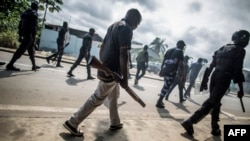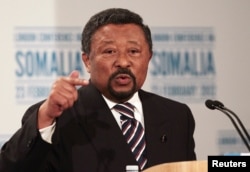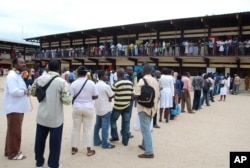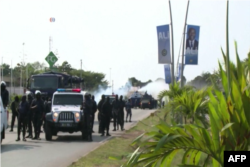Gabon's interior minister says more than 1,000 people have been arrested since the capital erupted in violence Wednesday, after officials announced the re-election of President Ali Bongo.
Thursday, police patrolled the streets of Libreville, after a night of clashes in which demonstrators set fire to the National Assembly and buildings nearby, and government forces stormed the headquarters of the opposition.
In Washington, the U.S. State Department urged all sides to come together “peacefully” to avoid future unrest, while not ruling out that “appropriate actions” might be considered going forward.
“We deplore the escalation of violence" following the release of provisional election results by the government, spokesman John Kirby said Thursday. “We call upon the security forces to respect the constitutionally guaranteed rights of all Gabonese citizens and of all residents of Gabon.”
Meanwhile, a security message was issued Thursday by the U.S. Embassy in Libreville to inform American citizens of “widespread, violent demonstrations, rioting and looting” there, and to ask Americans to remain in safe locations.
“Security forces have responded to the situation with tear gas and have placed roadblocks at major arterial roads, cutting off transportation across the city. There is also debris and burned cars blocking the roads in some areas,” the message said.
At least one fatality
Gabon government officials said at least one person was killed and 19 others were injured when government forces stormed the headquarters of the opposition. Opposition leader Jean Ping said earlier that two had been killed.
Ping is disputing the official election results that showed him losing by about 5,000 votes to Bongo. He said his campaign has evidence the election was rigged and plans to present it to Gabon's constitutional court.
At issue are the results from one province where the results show nearly 100 percent voter turnout, with Bongo receiving 95 percent of the votes.
Some members of the electoral commission resigned as the results were announced Wednesday.
While not commenting on whether Washington would ask for a recount, the State Department called on the Gabonese government to release results for each individual polling station.
The State Department said those were provisional results that still needed to be certified by Gabon’s constitutional court.
“We are asking that the legal procedures for certification of the results be followed according to Gabonese law in a fair and transparent manner,” Kirby said.
U.N. chief urges calm
U.N. Secretary-General Ban Ki-moon called for Gabon to remain peaceful in the aftermath of the hotly contested poll.
“The secretary-general urges all concerned political leaders and their supporters to refrain from further acts that could undermine the peace and stability of the country,” his spokesman said in a statement. “He also calls on the authorities to ensure that the national security forces exercise maximum restraint in their response to protests.”
A spokesman for the government said the security forces raided the opposition building in search of people who had set fires near the parliament building earlier in the night.
"Armed people who set fire to the parliament had gathered at Jean Ping's headquarters along with hundreds of looters and thugs. ... They were not political protesters but criminals," Alain-Claude Bilie-By-Nze told AFP.
The U.S. Embassy called for all individual polling station results to be published after it said observers witnessed "many systemic flaws and irregularities" in the voting. The irregularities included polling stations opening late and "last-minute changes to voting procedures."
Both candidates declared victory after Saturday's vote, and each side accused the other of fraud during the vote count.
Gabon does not have a runoff system, so the candidate with the most votes in the 10-candidate field wins the election.
Ping was running to end a half-century of Bongo family rule. Ali Bongo succeeded his father, Omar Bongo, who died in 2009 after 42 years in office.
VOA Afrique contributed to this report.








